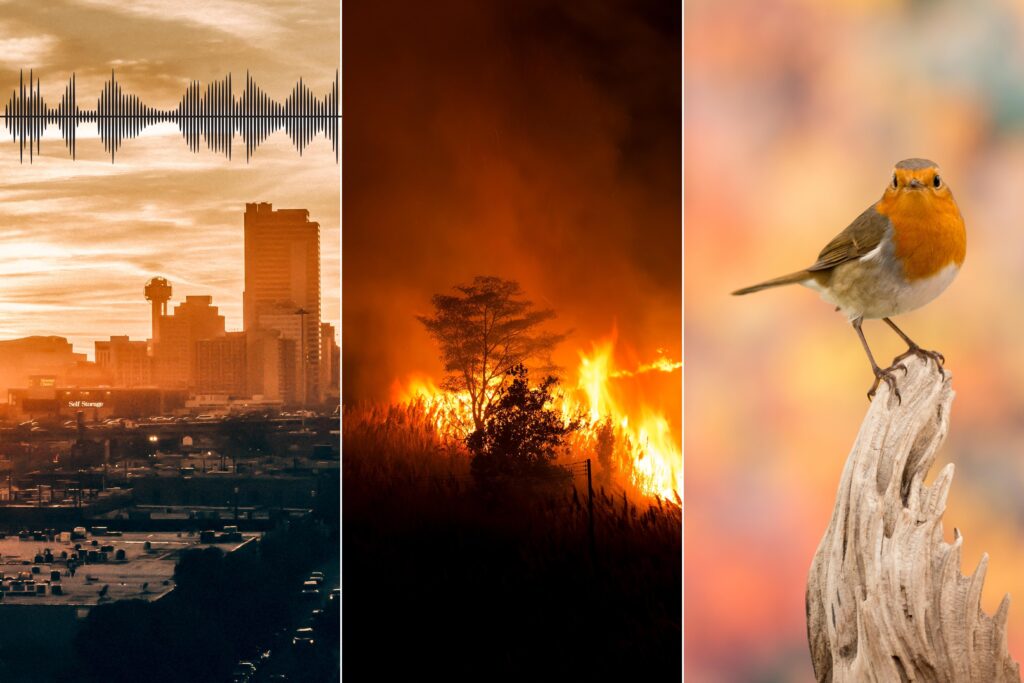The latest UN Environment Programme (UNEP) report published last Thursday identifies the most pressing emerging issues of environmental concern: wildfires, noise pollution, and the way our ecosystems operate.
The UNEP Frontiers report is published every year and, along with drawing attention to the issues, they also provide science-backed solutions for effective and timely responses. Some of these issues may be local or relatively small-scale today, but they have the potential to affect the whole planet if not addressed early.
The sixth and latest report was released just in time for the UN Environment Assembly to resume, with UNEP Executive Director Inger Andersen saying, “Urban noise pollution, wildfires and phenological shifts – the three topics of this Frontiers Report – are issues that highlight the urgent need to address the triple planetary crisis of climate change, pollution and biodiversity loss.”

Noise Pollution
Road traffic, railways, and the city at night; the increase in unwanted, prolonged and high-level sounds was noted as having a major impact on human health and our ecosystems.
Mainly affecting the elderly and marginalised communities who live near busy roads, the noise can cause chronic sleep disturbance. In the very young, this can even result in severe heart diseases and metabolic disorders.
Noise pollution also affects the animals around us, making it harder for birds, insects, and amphibians to communicate with each other, changing their behaviours over time.
The report encourages cities to prioritise reducing noise and invest in infrastructure such as tree belts along roads, green walls, and more green spaces generally.
It cites London’s Ultra-Low Emissions Zone, Berlin’s new cycle lanes, and Egypt’s national plan to combat noise as positive examples that the rest of the world should harness as it builds back better from COVID.
Phenological Shifts
Phenology refers to how different species will use their environment to determine the correct timings for stages of their life. For example, when the seasons get colder, birds will know it’s time to migrate.
The issue is climate change disrupts these natural rhythms, and now animals are being pushed entirely out of sync. Birds are not migrating at the right time; plants are not flowering correctly.
This could have devastating consequences on the planet, breaking down ecosystems and seriously affecting how much food we can grow.
Solving this issue, however, is quite complicated. The report flags just how crucial conservation goals are and, most of all, underscores how vital it is we reduce our emissions and limit the rate of global warming.

Wildfires
As I’m sure many of you have seen on the news, wildfires are becoming an increasingly serious issue in many areas of the world. The ‘Frontiers’ report noted that between 2002 and 2016, 424mn hectares (about the size of the EU!) were burned.
The impacts of this are clear, from long-term effects on human health to the loss of people’s homes. Worse, however, is that the pollutants caused by the wildfire then contaminate water sources, speed up glacier melt, and can even trigger landslides.
Addressing this simply means investing in prevention and management approaches. The report specifically notes the Brazilian-German Cooperation Project initially launched in 2014. The fire management scheme was launched in 3 protective areas and, after five years, scaled up to 74 regions, distributed all across Brazil.
It managed to reduce the area burned by wildfires up to 57% and stopped 36% of the associated greenhouse gas emissions.
While some of these issues can seem daunting, the Frontiers report allows us to note the issues that will cause the biggest threats to us and our planet and helps us put an end to them before they get out of hand.











